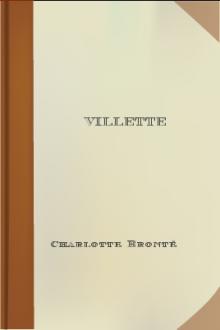Villette by Charlotte Brontë (learn to read activity book TXT) 📕

- Author: Charlotte Brontë
- Performer: -
Book online «Villette by Charlotte Brontë (learn to read activity book TXT) 📕». Author Charlotte Brontë
"How we shall conciliate this little creature," said Mrs. Bretton to me, "I don't know: she tastes nothing, and by her looks, she has not slept."
I expressed my confidence in the effects of time and kindness.
"If she were to take a fancy to anybody in the house, she would soon settle; but not till then," replied Mrs. Bretton.
CHAPTER II.
PAULINA.
Some days elapsed, and it appeared she was not likely to take much of a fancy to anybody in the house. She was not exactly naughty or wilful: she was far from disobedient; but an object less conducive to comfort--to tranquillity even--than she presented, it was scarcely possible to have before one's eyes. She moped: no grown person could have performed that uncheering business better; no furrowed face of adult exile, longing





Comments (0)